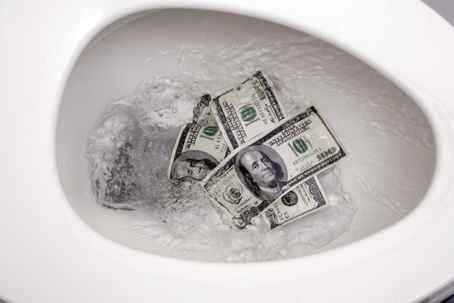It’s not an unusual occurrence to have customers call us and complain (loudly) about an increase in their water bill.
Believe me. I get it. Who can afford to be hit with an inflated bill demanding several hundred dollars more than you budgeted for?
In fact, just this week, I had a woman call me, nearly in tears, saying that her water bill this month was over $300!
“How can that be?” she moaned. “What’s going on?”
She scheduled a service call for that very day.
There are lots of reasons that your water bill can go up.
- In some cases, it’s because an underground pipe has sprung a leak, and water is spewing out below the surface where you can’t see it. (ServiceOne has underground camera equipment that looks at the drainage underground to find the exact source of the problem.)
- It might be because you have a leaky faucet. A single dripping faucet can drip slowly at a rate of 10 drops per minute. If it drips faster, there’s even more water going down the drain…3600 gallons a year or more that you’re paying for. (Even without the increased cost, it’s important to remember that only 1% of the water on the face of the earth is potable, so conservation is important!)
- If you have a sprinkler system, you may have accidentally changed a setting, causing it to water far more than you need.
- But by far the most common – and most costly cause of water consumption – is a faulty flapper in your toilet.
We sent one of our professional plumbers out to this customer to investigate, but what happened to this client has happened to hundreds of other people, and it’s all due to simple, unsophisticated parts in your toilet: The flapper and the chain.
What A Flapper Does:
A flapper is the round, disk-shaped rubber part on the bottom of your toilet. It’s raised and lowered by a simple chain. When the water in the tank reaches the pre-set level, the chain drops from the float and lowers the flapper, sealing the water into the toilet tank, ready to be released at the next flush.
Flappers are not complex, but they can be temperamental and are affected by the following:
- Age hardens those rubber flappers, making them less flexible and less able to seal the deal.
- Cleaning tablets containing bleach dropped into the toilet tank have been known to reduce the life of flappers.
- Chemical deodorizers dropped into the tank can also disintegrate into chunks and have been known to get underneath the seal of the flapper, making it impossible for the flapper to completely clamp down.
The Problem with Chains:
Those inexpensive little linked chains that pull the flapper up and down can also cause major problems:
If a chain gets kinked, it won’t lower the flapper all the way.
If a chain gets looped over the float arm, it leaves the toilet open, running constantly.
Trust me. Running water costs you money!
In the case of this particular client, our plumber found that a toilet in an upstairs guest bathroom a room that she hadn’t even been into for several weeks – was running nonstop because the flapper was old and no longer kept the water contained in the tank. Instead, it flowed freely in a continual flush, killing her budget and increasing her water bill by several hundred dollars.
What Can You Do?
If you think you may have a problem with a faulty flapper, it’s easy to check.
Lift the back of your tank off and drop in several drops of food coloring.
(Don’t get me wrong. Food coloring is a great option for this test, but if you don’t have it handy, one of my customers claims to have effectively tested her flapper-fitness by using red cooking wine!)
Don’t flush the toilet. Instead, look to see if any of the coloring leaks into the toilet bowl.
If it does, it’s time to call ServiceOne Air Conditioning and Plumbing to get your toilet tuned up and back to top condition so that it doesn’t kill your budget and increase your bill!
And if you want true peace of mind, sign up for a ClubOne Membership. ServiceOne will check your HVAC and plumbing systems automatically each year to prevent problems just like this.

